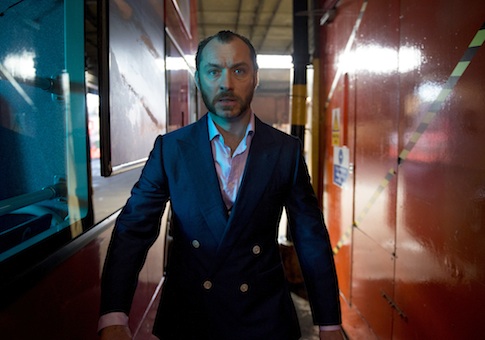It’s easy to understand why an actor would be attracted to a movie like Dom Hemingway. It’s filled with showy speeches and outrageous dialogue, the sort of things a thespian can really chew on if they’re so inclined.
For instance, the film opens on a close up of the titular Dom (Jude Law), who proceeds to deliver what will likely go down in history (infamy?) as the "My Cock Soliloquy." Filling the frame as he stares into the camera (and, thus, out at the audience), Hemingway shares with us his rather impressive self-regard for his member.
"A painting of my cock should hang in the Louvre," he says, informing us that his package is magnificent, exquisite, and rapturous. Dom goes on in this vein for a while, aggressively rocking back and forth, spittle occasionally flecking forth. The language is florid and grotesque and oddly confused. He tells us at one point that his member could save starving Somali children, an image at once cannibalistic and pedophilic and indicative that writer/director Richard Shepard got a bit carried away when he was putting this dreadful little speech together.
Dom’s self-confidence masks an uncertainty about his place in the world. He’s been in lockup for 12 years—in addition to his wife dying and his daughter having grown, there’s no smoking in the pubs, and it’s hard to tell which of these facts hits him hardest. Now that he’s out, he wants what’s coming to him. He and his buddy Dickie (Richard Grant) are headed to France to collect what’s owed Dom by Russian mobster Mr. Fontaine (Damian Bichir).
In short order Dom wins and loses the money owed to him, his own hubris costing him not only his fortune but also his sense of purpose. Confronted by mortality and bereft of any sort of familial connection, Dom tries to win the love of his grown daughter and get back into the safe-cracking game.
It is, unfortunately, hard to tell why we should care. Dom simply isn’t a terribly compelling character. It’s not just that he’s a bad person; this is, after all, the age of the anti-hero. True, his thuggishness is uncharming. But that’s not necessarily a deal breaker: think of Tom Hardy’s titular villain in Nicolas Winding Refn’s Bronson.
The larger problem is that Dom’s motivations are muddled. He behaves inconsistently, in unbelievable ways. In part, that’s because this is an incredibly chatty film: Characters are constantly verbalizing their feelings. We are told, not shown. So what Shepard likely considers "growth" later in the film comes across as little more than a ruse, another clever collection of snappy lines and preening patter.
It’s clear that Law was having fun as he hammed it up for the cameras, as was Grant as his partner in crime, Dickie. The two have pretty solid chemistry and decent comic timing. But their exploits fail to add up, resulting in an angry and noisy romp that left this reviewer feeling cold.
